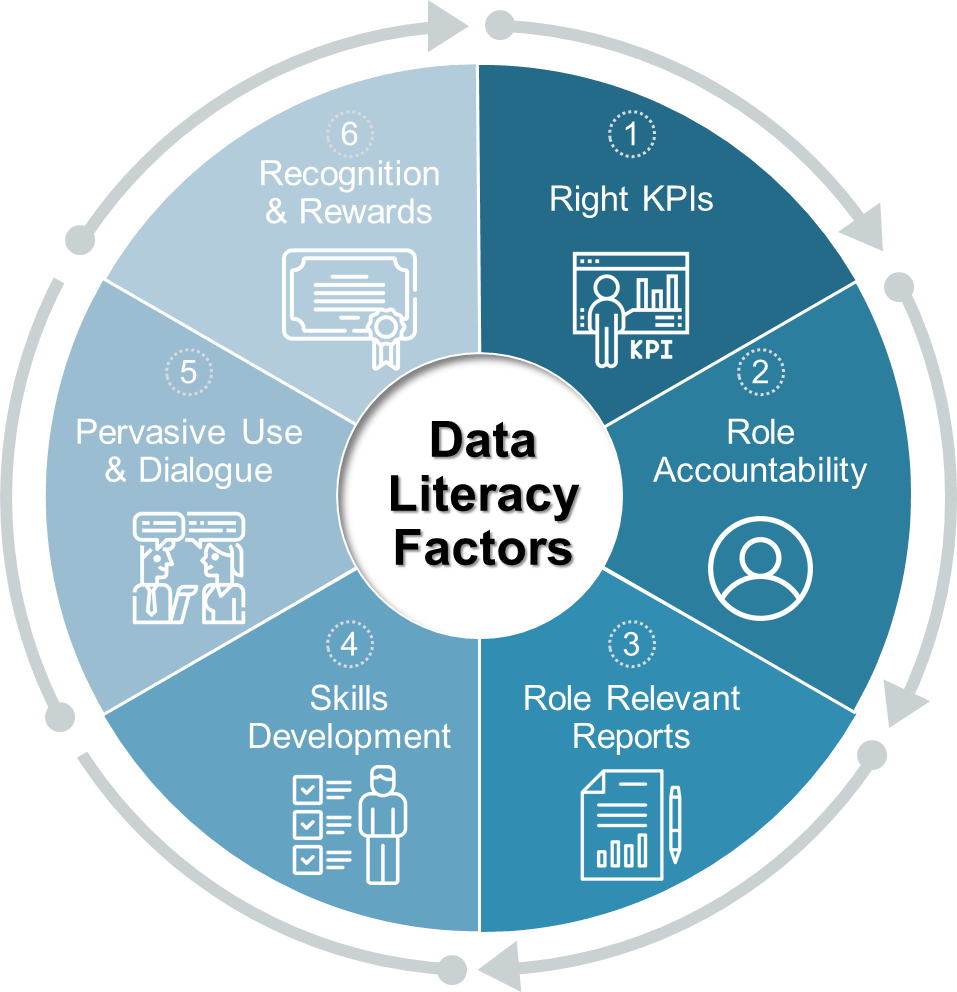Introduction
Data Literacy: In today’s increasingly data-driven world, reading, analysing, and making decisions based on data is no longer a niche skill—it is a necessity. From marketing and finance to healthcare and education, data touches nearly every aspect of modern business. This is where data literacy comes in—a fundamental skill that empowers professionals at all levels to understand and utilise data effectively.
As organisations strive to become more agile and insights-driven, data literacy is emerging as a core competency in the modern workforce. Whether you are a team leader trying to optimise performance metrics or a recent graduate exploring career opportunities, improving your data literacy can significantly enhance your decision-making capabilities and professional value. The importance of data literacy has become all evident with the permeation of data-driven technologies into almost every business domain.
What Is Data Literacy?
Data literacy can be defined as the ability to read, understand, create, and communicate data as information. It involves knowing how to ask the right questions of data, interpret visualisations such as graphs and dashboards, and make data-informed decisions.
Data literacy is not about becoming a data scientist. Rather, it is about being comfortable with the basics—knowing what data is, where it comes from, how it can be manipulated, and, most importantly, how to interpret it meaningfully.
Why Data Literacy Matters More Than Ever
As digital transformation accelerates, data is being generated at unprecedented rates. According to IDC, the global datasphere is expected to reach 175 zettabytes by 2025. With such vast volumes of information at our fingertips, organisations need employees who can confidently and clearly navigate this sea of data.
Here are a few reasons why data literacy is becoming indispensable across business domains in today’s world:
- Informed Decision-Making: Data-literate employees are better equipped to make business decisions based on facts rather than intuition or conjecture.
- Improved Collaboration: Teams with a common understanding of data can communicate more effectively, leading to smoother workflows and fewer misunderstandings.
- Competitive Advantage: Businesses that invest in building a data-literate workforce are more likely to outperform competitors by leveraging insights faster and more efficiently.
- Career Growth: Individuals with strong data skills often enjoy broader career opportunities and higher earning potential, regardless of industry.
Key Elements of Data Literacy
Being data literate involves more than just understanding numbers. It encompasses several critical skills:
Data Interpretation
Understanding charts, graphs, and dashboards is fundamental to data literacy. This means spotting trends, identifying outliers, and drawing conclusions from visual data representations.
Critical Thinking
Not all data is created equal. Data-literate professionals must evaluate the source, context, and quality of data before drawing insights. They question the data instead of accepting it at face value.
Basic Statistical Knowledge
You do not need to be a statistician, but a grasp of basic concepts like averages, percentages, correlation, and probability is essential for interpreting data correctly.
Communication Skills
One of the most overlooked aspects of data literacy is the ability to tell a story with data. Communicating findings clearly—whether through reports, presentations, or dashboards—is vital to ensuring that insights lead to action.
How to Improve Your Data Literacy
If you are looking to boost your data literacy, the good news is that more resources are available than ever. Here are some effective strategies:
Take a Formal Course
Structured learning is one of the most reliable ways to develop data skills. Enrolling in a formal data course in a reputable learning institute can be a great starting point. Hyderabad, for instance, is fast emerging as a tech and analytics hub, offering access to top-tier training institutes and industry mentors. The city has several quality learning institutes. Bangalore, Mumbai, Chennai, and Pune are also reputed for advanced-level technical learning.
Join a Workshop or Bootcamp
Short-term, intensive programs like Data Analytics Course can provide hands-on experience and practical skills in tools like Excel, SQL, Python, and Tableau. These are perfect for professionals who want to upskill quickly without committing to a long-term course.
Learn by Doing
Start with simple projects such as tracking expenses or analysing publicly available datasets. Platforms like Kaggle, DataCamp, and Coursera offer interactive programs that can expose you to real-world experience.
Stay Updated
Data tools and practices are constantly evolving. Following industry blogs, listening to data-related podcasts, and engaging with online communities can help you stay current and connected.
Data Literacy Across Industries
Data literacy is not just for analysts and IT professionals. Its relevance spans multiple sectors:
- Healthcare: Doctors and administrators use data to improve patient outcomes and streamline operations.
- Finance: Analysts draw heavily from data to assess risks, forecast trends, and make investment decisions.
- Retail: Sales managers use customer data to optimise product offerings and enhance user experiences.
- Education: Educators track student performance data to tailor instruction and improve learning outcomes.
No matter your profession, developing data literacy is likely to pay dividends.
How Organisations Promote Data Literacy
While individual effort is crucial, companies also play a vital role in fostering a data-literate culture. This includes:
- Offering Training Programs: Employers should provide regular opportunities for employees to develop data skills.
- Creating Accessible Tools: User-friendly dashboards and reporting tools can help democratise data across departments.
- Encouraging a Culture of Curiosity: Organisations can empower employees to engage more deeply with data by valuing questions and promoting critical thinking.
Final Thoughts: Embrace the Data-Driven Future
Data is the new language of business, and being fluent in it is a game-changer. Whether you’re a student, a manager, or an entrepreneur, improving your data literacy can enhance your ability to make data-backed decisions, collaborate effectively, and stay competitive in your field.
Investing time and effort into understanding data is no longer optional—it is essential. With resources like a Data Analytics Course in Hyderabad or any targeted data learning program, building your data skills has never been more accessible.
As the modern workplace continues to evolve, those who can harness the power of data will be better positioned to lead, innovate, and succeed.
ExcelR – Data Science, Data Analytics and Business Analyst Course Training in Hyderabad
Address: Cyber Towers, PHASE-2, 5th Floor, Quadrant-2, HITEC City, Hyderabad, Telangana 500081
Phone: 096321 56744



